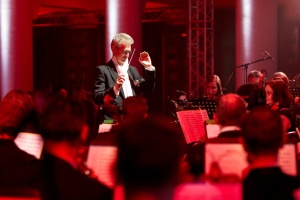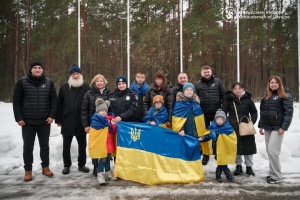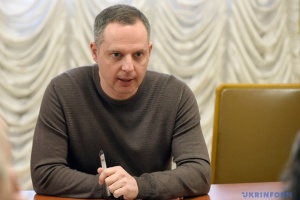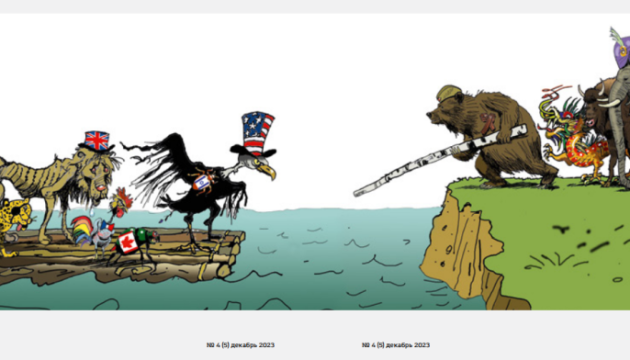
Anti-Semitic card of Russian propaganda
On the one hand, the Russian authorities fuel xenophobic, in particular anti-Semitic, sentiments within the Russian Federation. On the other hand, they actively accuse neighbors, including Ukraine, of “reviving Nazism,” hence anti-Semitism.
The Center for Strategic Communication and Information Security explains why the Kremlin uses the anti-Semitic topic and how.
How the Kremlin plays the anti-Semitic card
Russian propaganda is playing the card of anti-Semitism to harm Ukraine and strengthen Putin’s regime. To this end, the Kremlin:
● promotes a narrative about “Ukrainian neo-Nazism,” about wild anti-Semitism, allegedly inherent in Ukrainians, etc.;
● carries out measures to artificially inflate anti-Semitic sentiments in Ukraine;
● plays on anti-Semitic sentiments in Russia and fuels the anti-Israeli agenda.
The topic of “Ukrainian neo-Nazism” is used both for domestic Russian consumption and is actively promoted abroad. The regime aims to:
● discredit Ukraine in the eyes of international partners;
● create a stable associative array “Ukrainians – Nazis – anti-Semites”;
● strengthen the division lines in Ukrainian society;
● enhance anti-Ukrainian sentiments in Israel (and anti-Israeli ones in Ukraine) to maximize the complex of mutual claims and complicate relations between the states.
One of the tasks of the Russian special services is to demonstrate to the world that anti-Semitism and Nazi ideology are allegedly widespread and have a serious impact in Ukraine. To this end, active measures and regular information attacks are carried out.
At first glance, the election of Volodymyr Zelenskyy, who is of Jewish origin, as president of Ukraine in 2019 should have been a strong blow to the narrative about almost innate anti-Semitism of Ukrainians constructed by the Russians. But the Kremlin propaganda is trying to turn even this fact into a “proof” of the true nature of the picture of the world it constructed.
Attempts to incite anti-Semitism in Ukraine
To discredit and weaken the Ukrainian national movement, the anti-Semitic card was played by the Russian Empire and the Soviet Union. The Russian Federation continued this tradition. Each celebration of Rosh Hashanah by Hasidic pilgrims in Uman was accompanied by a wave of anti-Semitic publications. The traditional meeting of any Ukrainian president with the leaders of the Jewish community quickly turned into a “proof” of the dependence of the authorities on the “qahal.”
Information attacks increased significantly after the pro-European political forces came to power as a result of the Orange Revolution and the Revolution of Dignity. “Lists of Jews” among politicians were spread in the information space through social networks, marginal Internet resources, and even by placing leaflets on the streets. They featured both real Jews and those whom “secret” Jewish surnames were simply given by fake makers.
During the full-scale invasion, the Russians revived the conspiracy theory about the “New Jerusalem.” This is one variation of the so-called “Jewish conspiracy.” The theory is that the Jews allegedly plan to buy up land or otherwise seize part of the territory of Ukraine and settle it. The Ukrainian authorities allegedly contribute to the implementation of these plans.
Postings “exposing a conspiracy” circulate on Telegram, X (Twitter), Facebook, and other social networks. The fake news is promoted as aggressively as possible on TikTok, where many new video messages from bloggers and excerpts from old interviews of conspiracy theorist Igor Berkut appeared in October.
Former MP of Ukraine Illia Kyva was involved in the spread of conspiracy. However, according to Kyva’s version, the participants in the conspiracy claim not the East and South of Ukraine with Crimea inclusive, but Galicia.
Since the 2000s, conspiracy theories about the “New Jerusalem” in Ukraine have been spread mainly by marginal figures and movements of openly anti-Semitic and pro-Russian orientation. The above-mentioned Igor Berkut, a graduate of the Moscow Higher Command School, headed a small party called Great Ukraine and ran for a Member of Parliament. Since 2020, he has been wanted on suspicion of treason. According to the SSU, Berkut has a Russian passport.
Among Russian officials, Sergei Glazyev can be considered the most notable public supporter of anti-Semitic conspiracy, who in 2012-2019 had the status of an advisor to the President of Russia. In the 2000s, Glazyev regularly visited Ukraine, was on air of Ukrainian TV channels and built a network of agents of influence. He managed to become a foreign member of the National Academy of Sciences of Ukraine. In 2014, Glazyev coordinated public actions of Russia’s supporters in Donetsk, Luhansk, and Odesa.
Russian special services used anti-Semitic conspiracy to incite sentiments among residents of the East and South of Ukraine to disobey the government and recruit mercenaries during the so-called Russian Spring in 2014. The locals were told scary stories about Kyiv allegedly agreeing to “give the Jews” these regions. The beginning of hostilities in Donetsk and Luhansk oblasts was “explained” by the fact that the Jews “drove a wedge between the fraternal Slavic peoples” to “clear the territory” for themselves. The promotion of this narrative intensified during the full-scale invasion. Another wave of fake news was spread regarding the alleged “allocation of USD 84 bln by the Knesset to purchase Ukrainian land.” This fake has been popping up on social media periodically since at least 2018.
Photos and videos of the celebration of Rosh Hashanah by Hasidic pilgrims in Uman were repeatedly presented by conspiracy theorists and Russian propagandists as “proof” of the beginning of implementing the “New Jerusalem” plan. In particular, in September 2022, messages of this content were shared in the Georgian segment of social networks.
Anti-Semitic provocations by Russian special services
Any publications in the Ukrainian segment of social networks, even of obvious Russian origin, anti-Semitic statements of persons at least somehow connected with Ukraine, even outright traitors and agents of the Russian special services, instantly become “proof” of the flourishing of anti-Semitism in Ukraine for the Kremlin. They are used to discredit Ukraine and Ukrainians in the eyes of citizens of foreign countries, in particular Israel.
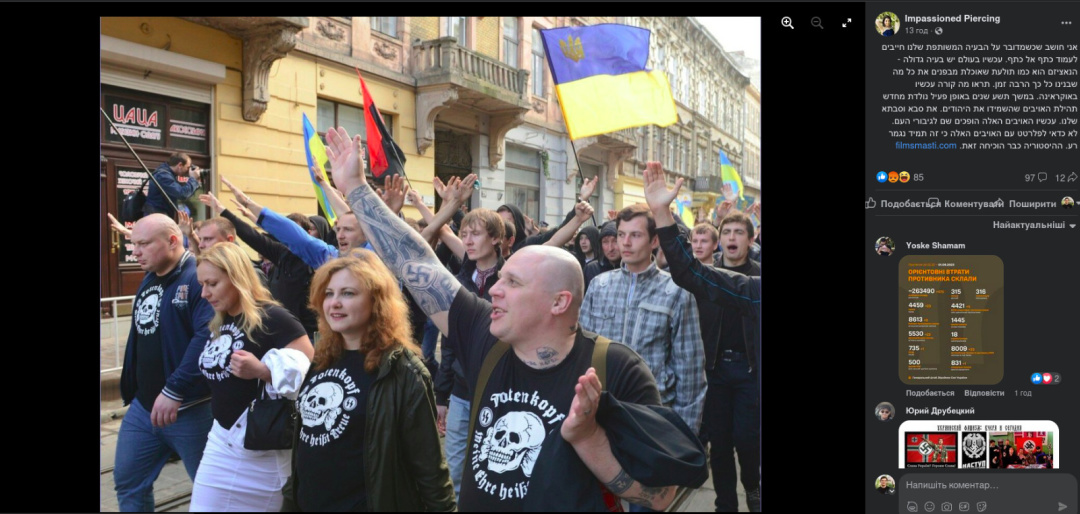
Russian Facebook ads targeting Israel
To enhance the effect, the Russian special services have repeatedly resorted to organizing anti-Semitic provocations in Ukraine. The most popular acts include drawing Nazi symbols in public places, planting a pig’s head, or trying to set synagogues on fire. After 2014, the intensity of such provocations increased, which should have been an additional confirmation of the statement of Russian propaganda about the “Nazi coup.”
In 2017, the Ukrainian police detained members of an organized criminal group from Cherkasy Oblast. According to the investigation, during the year, from autumn 2016 to autumn 2017, the suspects committed a number of crimes aimed at inciting ethnic hatred. In particular: they made an anti-Semitic inscription on the facade of a synagogue in Chernivtsi and tried to set fire to a synagogue in Lviv. Uman, which is the site of the annual Hasidic pilgrimage, has been the target of repeated attacks. In 2016, the criminals attacked the grave of Tsadik Nakhman and planted a pig’s head with a swastika carved on it. The following year, they set off an explosion and injured a 13-year-old Israeli.
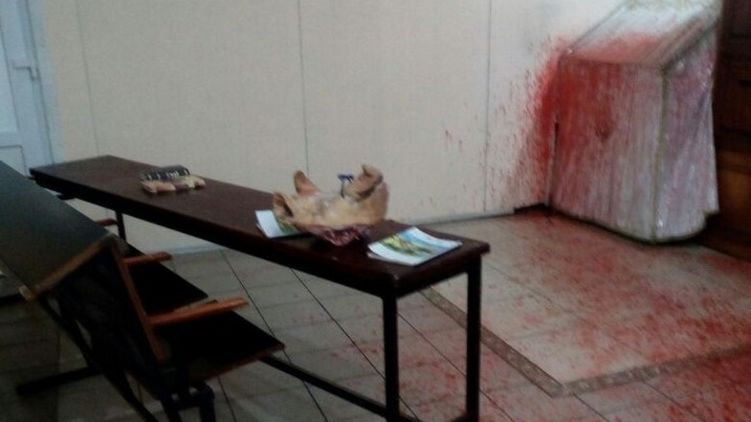
The investigation established that the instructions to the members of the group were given by former MPs from the Party of Regions, who are hiding from Ukrainian justice in the Russian Federation and in the occupied territories. One of them, Volodymyr Oliinyk, the former mayor of Cherkasy, is a co-founder of the Russian-controlled “Committee for the Salvation of Ukraine.” The puppet organization includes collaborators who openly work for Russian special services, serve Kremlin propaganda and are involved in Russia’s aggression against Ukraine.
This is just one example of the so-called false flag operations—provocations to discredit the enemy and artificially create pretexts for an attack. After all, it was the “flourishing of Nazism” in Ukraine that was the pretext for the full-scale aggression. In his address on February 24, 2022, Putin called “denazification” one of the main goals of the “special operation.”
Anti-Semitism in domestic politics of Putin’s Russia
Russia has a long historical tradition of the state anti-Semitism. In the Russian Empire, discrimination against Jews was part of the official policy. The Pale of Settlement, which limited Jews in their free movement and choice of place of residence, existed from Catherine’s times until the fall of the Romanov Empire. Censorship did not oppose the spread of openly anti-Semitic literature. Because of the Black Hundred chauvinists, the Russian word pogrom migrated to foreign languages.
In the USSR, proletarian internationalism was part of the official ideology. However, the declarations did not prevent the Kremlin from pursuing an anti-Semitic policy under the guise of combating cosmopolitanism, Zionism, or confrontation with the “Israeli military.” The case of the Jewish Anti-Fascist Committee and the “doctors’ plot,” fabricated in the last decade of Stalin’s reign, were openly anti-Semitic. Even in more “tolerant” times, discrimination on the basis of nationality was part of everyday life. The infamous “item 5” (nationality in the questionnaire documents was indicated in the fifth item, after the last name, first name, patronymic, and date of birth) created obstacles for Jews and representatives of other discriminated nationalities (in particular, Germans and Crimean Tatars) to higher education or career growth.
To bypass them, Soviet citizens changed their Jewish names, last names, and nationality in the questionnaire to more “trustworthy” ones. There were whole industries where Jews could not get: the USSR could not have a Jewish general, an astronaut, or a Central Television announcer. The topic of the Holocaust was a taboo. Due to the unbearable atmosphere, many Jews were looking for an opportunity to emigrate from the USSR to Israel.
Much has changed in Russia since the collapse of the Soviet Union. Borders were opened for those who sought to emigrate. The market economy and the primary accumulation of capital contributed to the emergence of a social group of “new Russians,” among whom were citizens of the Russian Federation of different nationalities, in particular Jews. In the 1990s, the marginal politicians of the far-left and far-right, who tried to play on the imperial-Soviet resentment, tried to incite the topic of anti-Semitism.
In the early 2000s, the situation began to change. Colonel of the FSB Vladimir Putin became the President of the Russian Federation. The power was concentrated in the hands of the security forces, among whom anti-Semitic sentiments were particularly strong. First, in law enforcement agencies, in particular special services, the “item 5” was of decisive importance, and for decades they were closed to Jews. Secondly, the KGB of the USSR, which was succeeded by the FSB of the Russian Federation, had a long tradition and practiced methods of inciting xenophobic, including anti-Semitic, sentiments.
The Kremlin taking the business empires of Boris Berezovsky, Vladimir Gusinsky, and Mikhail Khodorkovsky by force was presented as “fighting the oligarchs.” At the same time, unofficial and semi-official channels signalled to the population that it was about fighting “Jewish capital.” Shortly before his death, Vladimir Zhirinovsky once again returned to this topic, making another provocative statement about the responsibility of Jews for anti-Semitic sentiments in Russia.
“Yeltsin’s entire team is Jewish. We hear names: Khodorkovsky, Berezovsky, Gusinsky, Abramovich. Russians have not the most positive associations in this regard,” the leader of the Liberal Democratic Party of Russia said in 2021.
After the demonstrative execution of opposition politician Boris Nemtsov, Putin publicly expressed his condolences to his mother. The telegram, which was published by the Russian media, indicated the maiden name of Dina Yakivna — Eidman. This was done on purpose to once again remind of the ethnic origin of the “national traitor.”
During the full-scale war with Ukraine, propaganda began to look for Jewish roots of show business figures who left Russia and disagreed with the Kremlin’s policy. Celebrities remaining in Russia and supporting the “special operation” publicly “brand” the fugitives, focusing on their Jewish origin.
The senior leadership of the Russian state resort to anti-Semitic rhetoric. Putin calls Ukrainian President Volodymyr Zelenskyy “a disgrace to the Jewish people,” which is allegedly only a screen for “Ukrainian Nazis.” Foreign Minister Sergei Lavrov is spreading an anti-Semitic conspiracy about Adolf Hitler’s “Jewish roots.”
The HAMAS terrorist attack on Israel on October 7, 2023, caused a new wave of anti-Semitic campaign in the Russian Federation. Representatives of the regime did not confine themselves to formal statements of support for Palestine or criticism of the actions of the Israeli government.
Three weeks after the attack, the bloody footage of which spread around the world, Moscow once again welcomed a delegation of HAMAS led by Abu Mazrook. His meeting with Mikhail Bogdanov, the special representative of the Russian President for the Middle East, was a signal of the Kremlin’s actual support for the group’s actions and caused harsh criticism on the part of Israel.
However, the Kremlin no longer even conceals that it considers Israel its geopolitical enemy. This was openly written by Sergei Naryshkin, the head of the Foreign Intelligence Service, in a programme article published in the December issue of the departmental magazine Spy. The article is illustrated by a caricature in which the countries of the world are depicted in the form of animals and fantastic creatures that symbolize them. Thus, along with a Chinese dragon, a Russian bear, an Indian elephant, and a British lion, there was an Israeli tick sucking on the body of an American eagle.
Apparently, the Russian cartoonist was inspired by examples of Hitler’s propaganda, which promoted the narrative about “Jewish parasites,” depicting them in the form of bedbugs, lice, and leeches that “suck the blood” of other peoples.

Ramzan Kadyrov, “Putin’s infantryman,” also likes to play the anti-Semitic card, trying to use it to enhance his authority among Muslims in the Russian Federation and abroad.
The regime’s efforts to incite anti-Semitic sentiment in Russia are not without consequences. The first open manifestation of hysteria was the October riots in Dagestan, when an angry crowd vandalized the Makhachkala airport in search of Jews.

Former Chief Rabbi of Moscow Pinchas Goldschmidt warned Jews about the threats of staying in Russia back in December 2022.
“When we look back over Russian history, whenever the political system was in danger you saw the government trying to redirect the anger and discontent of the masses towards the Jewish community. We saw this in tsarist times and at the end of the Stalinist regime,” Goldschmidt said in an interview with The Guardian.
Conclusions
Russian special services have a long tradition of inciting ethnic hatred to solve the regime’s domestic and foreign policy problems. To achieve the goal, the Kremlin uses means of propaganda and disinformation, false flag operations, actively plays on prejudices and phobias.
The Putin regime barely hides that its representatives have openly anti-Semitic views. Propaganda pays significant attention to their ethnic origin in the process of searching for internal enemies and “national traitors,” works to create an associative array “Jews – lies – betrayal.”
Fuelling anti-Jewish sentiments in Russia, the Kremlin accuses Ukraine of anti-Semitism, mirroring its own criminal practices on the enemy.
Center for Strategic Communiction and Information Security


